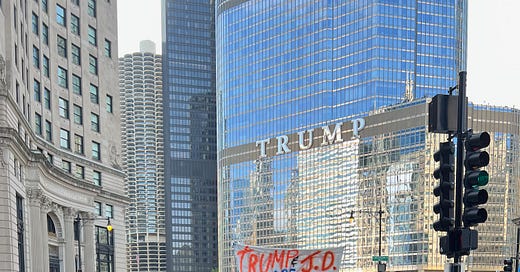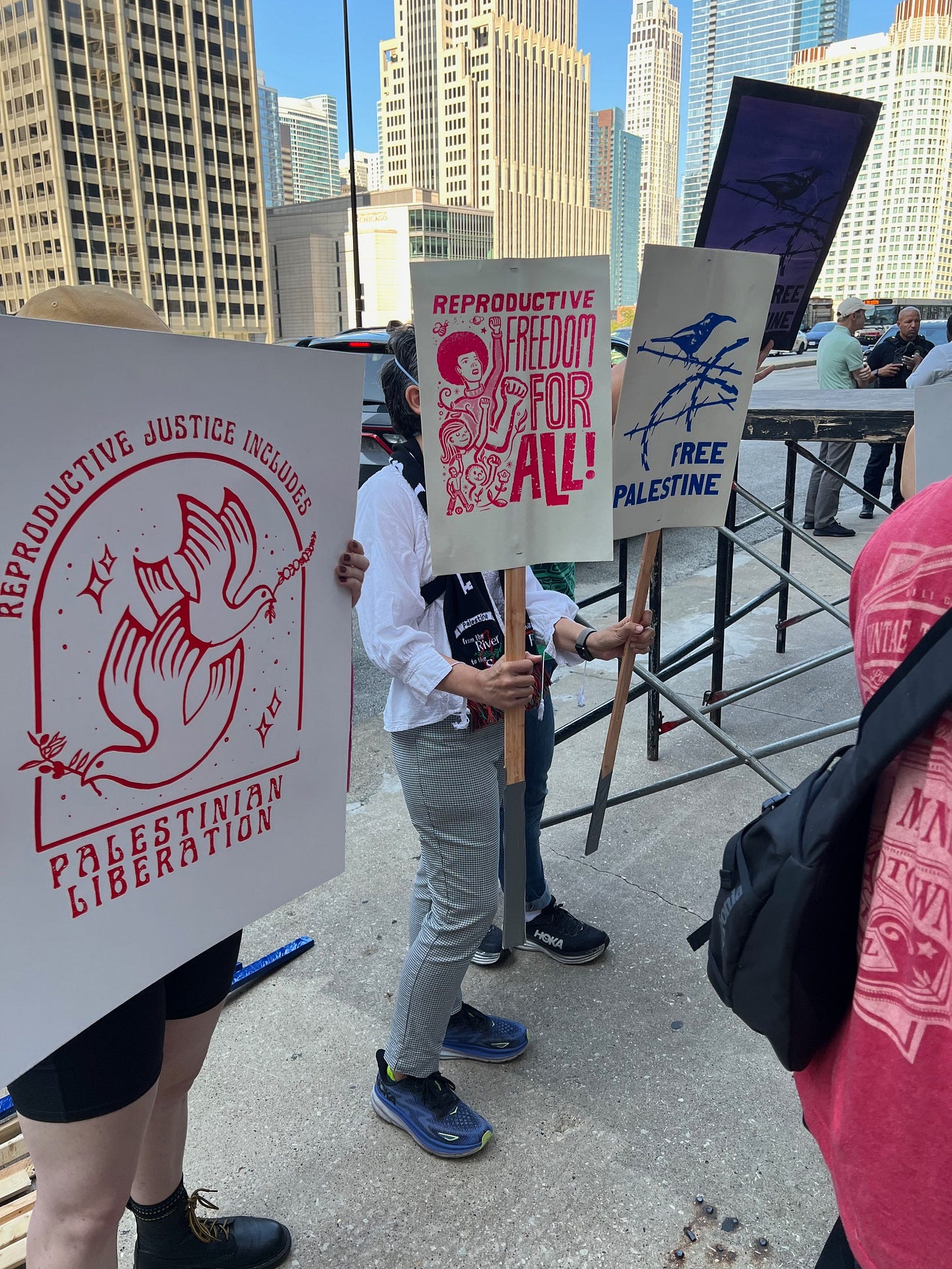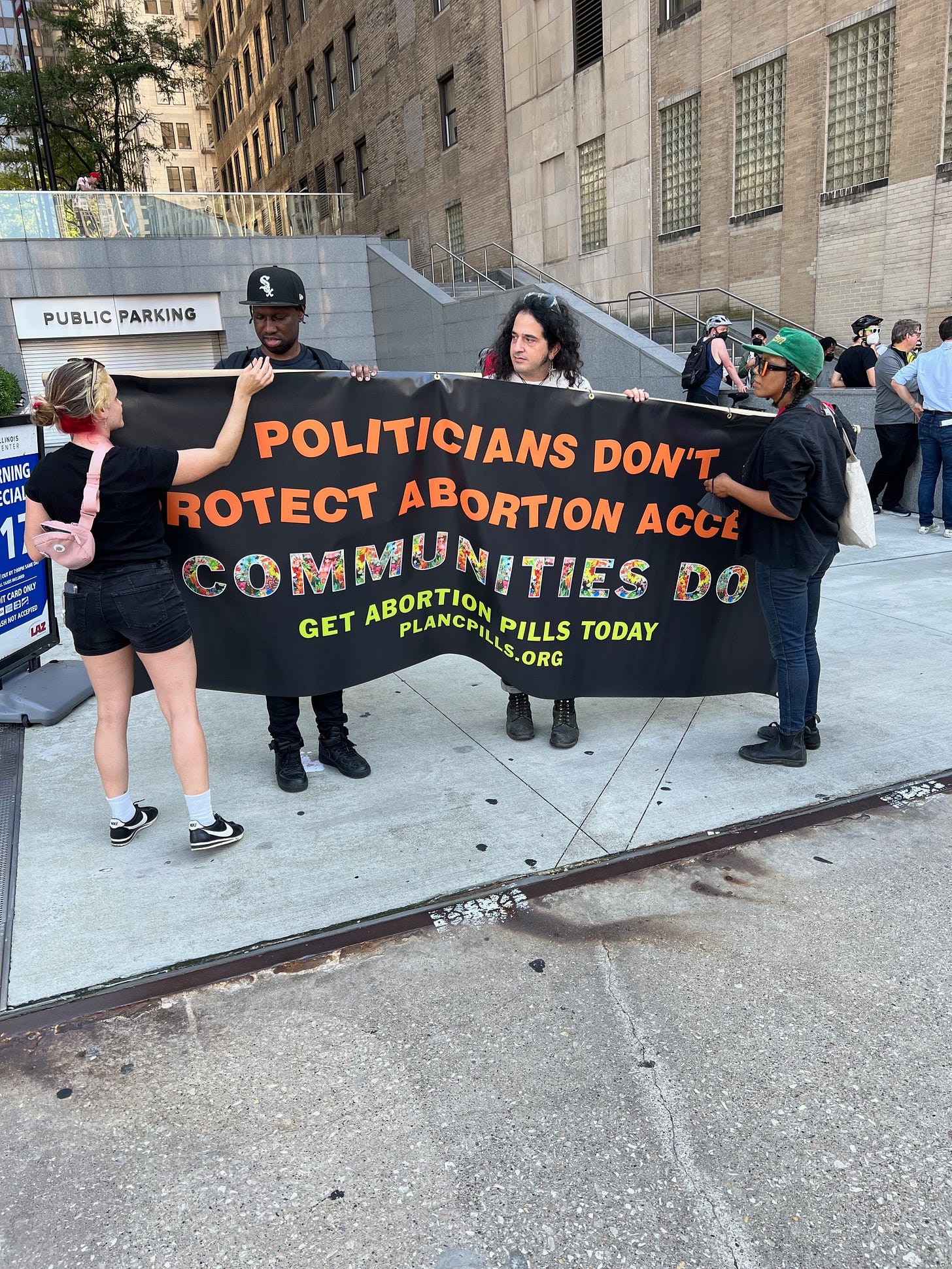Protests precede Democratic National Convention in Chicago
Sunday's organizers connect Palestinian cause and reproductive rights
Note to readers: I am neither a diplomat nor a Middle Eastern scholar. I don’t plan on offering solutions or taking sides in the debate over Israel. This newsletter aims to perform the primary journalistic obligation–to document history as it unfolds with all its complexity and disagreements. If it upsets readers or appears biased, I will answer their questions or address their concerns via e-mail.
As Democratic groups prepared for a fashionable soiree of events at its national convention, hundreds of grassroots protestors gathered at the intersection of Michigan Avenue and Wacker Drive in Chicago. The event was not just a protest but an attempt to connect the reproductive justice cause to that of Palestinian liberation.
Bodies Outside of Unjust Laws, a national coalition of reproductive justice and LGBTQ organizations, arranged the speakers, including a union activist, professor, rabbi, lawyer, and someone who partook in the Occupy Wall Street protests.
There will be at least seven similar protests with themes that relate to Palestinean persecution, anti-poverty efforts, anti-corporatism, and a historical connection to protests that happened at the 1968 Democratic convention, which was marred by bloodshed brought on by police brutality toward student protestors of the Vietnam war.
As this unfolded, Planned Parenthood sent an email asking its DNC fundraiser attendees to not speak to or answer questions from protestors.
The protestors began the event by singing a song that emphasized bodily autonomy. Scout Bratt, a transgender activist who emceed the event, explained the connection.
“Palestinian Liberation is reproductive justice, and we reject any political compromises on bodily autonomy,” Bratt said.
Throughout the rally, signs and shouts characterized the Israeli-Hamas war as “reproductive genocide.”
There were also calls to liberate Israel from the river to the sea, which many Jews have taken to mean ethnically cleansing the area of their population so that the land is returned to Palestineans. Writer Bari Weiss and others have heavily criticized Democratic activists for chanting that.
The Israeli-Palestinian debate has long been fomenting within the reproductive rights movement. In an October newsletter last year, the Religious Coalition for Reproductive Choice framed the war as a perpetuation of a colonialist narrative.
“We clearly see how these atrocities are part of a longstanding cycle of violence shaped by the legacy of colonialism, racism, and religious oppression that spans millennia.”
A week later, the organization issued an apology for its use of the word colonialism.
While we mourn the tragic loss of innocent Israeli and Palestinian lives, it’s also critical that we avoid oversimplifications that degrade our moral clarity and shared dignity as humans. The intention of our statement was to express an all-encompassing compassion and bear witness to the totality of human suffering in the region, but we missed the mark.
It’s important to note the cooperation that Islamic groups and Jewish ones have had since Roe was overturned. In the Alliance for Hippocratic Medicine v. U.S. Food and Drug Administration case, religious organizations filed an amicus brief supporting reproductive rights. Muslims for Progressive Values was one of the organizations involved. I spoke with Ani Zonneveld, its president, in February about it.
Zonneveld hoped the media would cover the war better and the respective sympathies in America. She also said that even with the disagreements–and Republicans' efforts to exploit them–there is a fundamental agreement between progressive Jewish and Muslim organizations that we should protect reproductive rights.
“There are these external factors, like Israel and Palestine, that can create a wedge between us,” Zonneveld said. “Even though there may be a gap between the two, between the Muslim organization and other Jewish organizations in our partnerships, it hasn't created that space, big enough, where we would end our partnership and relationship on this issue.”
At Sunday's protest, it wasn’t all focused on foreign affairs. Elizabeth Lalasz, a registered nurse who works in the public sector, criticized the Democrats for allowing Roe v. Wade to disintegrate slowly.
“Legal abortion is certainly something the right has been targeting for years, but it's also true that for decades, the Democratic Party has done little to actually protect it,” Lalasz said. “And it has allowed it to be chipped away, state by state and nationally as well, making it incredibly difficult to obtain, especially for poor and working-class people.”
I don’t think anyone should be surprised that there are protests at the DNC. The nomination process wasn’t handled well, and many voters believed too much influence was given to insiders instead of entrusted to voters, as it has been with virtually every other election. It also shouldn’t surprise people that everyone connects their cause to reproductive justice, which has won every time it’s placed on the ballot.
I’ll report more on the DNC as I’m here for the week.






